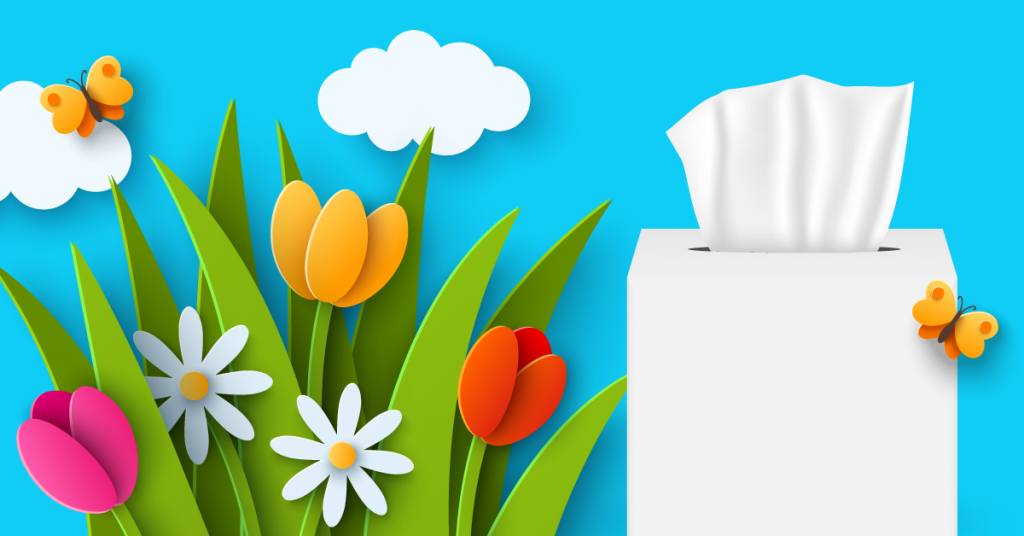Ah, spring. The season of blooming flowers, chirping birds, and… itchy eyes, runny noses, and constant sneezing? For allergy sufferers, the arrival of spring can be bittersweet. While everyone else enjoys the return of sunshine, allergy season brings a wave of discomfort. But fear not! With a little preparation, you can minimize your symptoms and enjoy the beauty of spring.
Know your enemy: Understanding allergies
Before we delve into strategies, let’s understand the root cause of seasonal allergies. Allergies occur when your immune system overreacts to harmless substances, like pollen, dust mites, or mold spores. When these allergens enter your body, your immune system releases histamines, which trigger allergy symptoms. Symptoms can vary from person to person but commonly include:
- Runny or stuffy nose
- Itchy, watery eyes
- Sneezing
- Coughing
- Postnasal drip
- Fatigue
Be proactive: Pre-season strategies
The key to managing allergies is being proactive. Here are some steps you can take before the peak allergy season hits:
- Consult with Oakdale ENT: Discuss your allergy history with our allergy specialists. They can help you identify your triggers and recommend the best course of treatment. This may include medication or immunotherapy (allergy shots or allergy drops), or a combination.
- Start early with medication: Don’t wait for symptoms to appear! Taking allergy medication, like antihistamines, a few weeks before the typical start of your allergy season can help prevent the development of symptoms or make them less severe.
- Track pollen counts: Stay informed about local pollen counts. Many weather websites and apps provide daily pollen forecasts. This information will help you predict peak allergy days and adjust your activities accordingly.
- Spring cleaning with a twist: Spring cleaning isn’t just about aesthetics; it can significantly improve your indoor air quality. Vacuum carpets, dust furniture, wash bedding in hot water (to kill dust mites), and declutter your home to minimize dust traps. Consider using an air purifier with HEPA filters to remove allergens from the air.
Minimize exposure during peak season
Once allergy season arrives, here are some strategies to minimize your exposure to allergens:
- Keep windows closed: It might be tempting to throw open the windows and let in the fresh spring air, but this can also invite pollen in. Opt for air conditioning during peak pollen hours, and consider using air purifiers in your home and car.
- Change clothes: Pollen can cling to your clothes throughout the day. When you come inside, change into clean clothes and shower to remove any lingering allergens.
- Shower before bed: Pollen can accumulate on your hair and skin throughout the day. Washing away pollen before bed can prevent nighttime allergy attacks.
- Pollen-proof your yard: If you spend a lot of time outdoors, consider planting low-allergen trees and flowers. There are many beautiful options available that won’t trigger your allergies.
- Wear a mask: While most of us have some level of mask fatigue, wearing a mask outdoors during high pollen count days can significantly reduce your exposure.
Learn more about minimizing your exposure to allergens.
Lifestyle habits for allergy relief
In addition to the recommendations above, incorporating some lifestyle changes may improve your overall allergy resilience:
- Dietary adjustments: While there’s no single “allergy cure” diet, some studies suggest that certain foods may reduce allergy symptoms. Consider incorporating quercetin-rich foods like apples, onions, and berries into your diet. Omega-3 fatty acids, found in fatty fish and flaxseeds, may also have anti-inflammatory effects that can help manage allergy symptoms.
- Hydration: Staying hydrated can help thin mucus and clear allergens from your nasal passages. Aim to drink plenty of water throughout the day.
- Nasal irrigation: Using a neti pot or saline nasal spray can help flush out pollen and other allergens from your nasal passages, providing relief from congestion and irritation.
- Stress management: Stress can worsen allergy symptoms. Practice relaxation techniques like deep breathing, yoga, or meditation to help manage stress and potentially reduce allergy symptoms.
Get help when you need it
If your allergies are severe or don’t respond well to over-the-counter medications, contact Oakdale ENT at 763-233-5755 to schedule an allergy consultation. We can provide a personalized treatment plan and discuss options like allergy shots or allergy drops for long-term relief.
Don’t let allergies hold you back from experiencing the joys of the season. Breathe easy and embrace the fresh air!
